- Home
- Anthony Trollope
Phineas Finn, the Irish Member Page 14
Phineas Finn, the Irish Member Read online
Page 14
Violet Effingham was now sitting in conference with her friend Lady Laura, and they were discussing matters of high import, – of very high import, indeed, – to the interests of both of them. ‘I do not ask you to accept him,’ said Lady Laura.
‘That is lucky,’ said the other, ‘as he has never asked me.’
‘He has done much the same. You know that he loves you.’
‘I know, – or fancy that I know, – that ‘…so many men love me! But, after all, what sort of love is it? It is just as when you and I, when we see something nice in a shop, call it a dear duck of a thing, and tell somebody to go and buy it, let the price be ever so extravagant. I know my own position, Laura. I'm a dear duck of a thing.’
‘You are a very dear thing to Oswald.’
‘But you, Laura, will some day inspire a grand passion, – or I daresay have already, for you are a great deal too close to tell; -and then there will be cutting of throats, and a mighty hubbub, and a real tragedy. I shall never go beyond genteel comedy, - unless I run away with somebody beneath me, or do something awfully improper.’
‘Don't do that, dear.’
‘I should like to, because of my aunt. I should indeed. If it were possible, without compromising myself, I should like her to be told some morning that I had gone off with the curate.’
‘How can you be so wicked, Violet!’
‘It would serve her right, – and her countenance would be so awfully comic. Mind, if it is ever to come off, I must be there to see it. I know what she would say as well as possible. She would turn to poor Gussy. “Augusta,” she would say, “I always expected it. I always did.” Then I should come out and curtsey to her, and say so prettily, “Dear aunt, it was only our little joke.” That's my line. But for you, – you, if you planned it, would go off to-morrow with Lucifer himself if you liked him.’
‘But failing Lucifer, I shall probably be very humdrum.’
‘You don't mean that there is anything settled, Laura?’
‘There is nothing settled, – or any beginning of anything that ever can be settled. But I am not talking about myself. He has told me that if you will accept him, he will do anything that you and I may ask him.’
‘Yes; – he will promise.’
‘Did you ever know him to break his word?’
‘I know nothing about him, my dear. How should I?’
‘Do not pretend to be ignorant and meek, Violet. You do know him, – much better than most girls know the men they marry. You have known him, more or less intimately, all your life.’
‘But am I bound to marry him because of that accident?’
‘No; you are not bound to marry him, – unless you love him.’
‘I do not love him,’ said Violet, with slow, emphatic words, and a little forward motion of her face, as though she was specially eager to convince her friend that she was quite in earnest in what she said.
‘I fancy, Violet, that you are nearer to loving him than any other man.’
‘I am not at all near to loving any man. I doubt whether I ever shall be. It does not seem to me to be possible to myself to be what girls call in love. I can like a man. I do like, perhaps, half a dozen. I like them so much that if I go to a house or to a party it is quite a matter of importance to me whether this man or that will or will not be there. And then I suppose I flirt with them. At least Augusta tells me that my aunt says that I do. But as for caring about any one of them in the way of loving him, – wanting to marry him, and have him all to myself, and that sort of thing, – I don't know what it means.’
‘But you intend to be married some day,’ said Lady Laura.
‘Certainly I do. And I don't intend to wait very much longer. I am heartily tired of Lady Baldock, and though I can generally escape among my friends, that is not sufficient. I am beginning to think that it would be pleasant to have a house of my own. A girl becomes such a Bohemian when she is always going about, and doesn't quite know where any of her things are.’
Then there was silence between them for a few minutes. Violet Effingham was doubled up in a corner of a sofa, with her feet tucked under her, and her face reclining upon one of her shoulders. And as she talked she was playing with a little toy, which was constructed to take various shapes as it was flung this way or that. A bystander looking at her would have thought that the toy was much more to her than the conversation. Lady Laura was sitting upright, in a common chair, at a table not far from her companion, and was manifestly devoting herself altogether to the subject that was being discussed between them. She had taken no lounging, easy attitude, she had found no employment for her fingers, and she looked steadily at Violet as she talked, – whereas Violet was looking only at the little manikin which she tossed. And now Laura got up and came to the sofa, and sat close to her friend. Violet, though she somewhat moved one foot, so as to seem to make room for the other, still went on with her play.
‘If you do marry, Violet, you must choose some one man out of the lot.’
‘That's quite true, my dear. I certainly can't marry them all.’
‘And how do you mean to make the choice?’
‘I don't know. I suppose I shall toss up.’
‘I wish you would be in earnest with me.’
‘Well; – I will be in earnest. I shall take the first that comes after I have quite made up my mind. You'll think it very horrible, but that is really what I shall do. After all, a husband is very much like a house or a horse. You don't take your house because it's the best house in the world, but because just then you want a house. You go and see a house, and if it's very nasty you don't take it. But if you think it will suit pretty well, and if you are tired of looking about for houses, you do take it. That's the way one buys one's horses, – and one's husbands.’
‘And you have not made up your mind yet?’
‘Not quite. Lady Baldock was a little more decent than usual just before I left Baddingham. When I told her that I meant to have a pair of ponies, she merely threw up her hands and grunted. She didn't gnash her teeth, and curse and swear, and declare to me that I was a child of perdition.’
‘What do you mean by cursing and swearing?’
‘She told me once that if I bought a certain little dog, it would lead to my being everlastingly – you know what. She isn't so squeamish as I am, and said it out.’
‘What did you do?’
‘I bought the little dog, and it bit my aunt's heel. I was very sorry then, and gave the creature to Mary Rivers. He was such a beauty! I hope the perdition has gone with him, for I don't like Mary Rivers at all. I had to give the poor beasty to somebody, and Mary Rivers happened to be there. I told her that Puck was connected with Apollyon, but she didn't mind that. Puck was worth twenty guineas, and I daresay she has sold him.’
‘Oswald may have an equal chance then among the other favourites?’ said Lady Laura, after another pause.
‘There are no favourites, and I will not say that any man may have a chance. Why do you press me about your brother in this way?’
‘Because I am so anxious. Because it would save him. Because you are the only woman for whom he has ever cared, and because he loves you with all his heart; and because his father would be reconciled to him to-morrow if he heard that you and he were engaged.’
‘Laura, my dear –’
‘Well.’
‘You won't be angry if I speak out?’
‘Certainly not. After what I have said, you have a right to speak out.’
‘It seems to me that all your reasons are reasons why he should marry me; – not reasons why I should marry him.’
‘Is not his love for you a reason?’
‘No,’ said Violet, pausing, – and speaking the word in the lowest possible whisper. ‘If he did not love me, that, if known to me, should be a reason why I should not marry him. Ten men may love me, – I don't say that any man does –’
‘He does.’
‘But I can't marry all the ten. And as for that busin
ess of saving him –’
‘You know what I mean!’
‘I don't know that I have any special mission for saving young men. I sometimes think that I shall have quite enough to do to save myself. It is strange what a propensity I feel for the wrong side of the post.’
‘I feel the strongest assurance that you will always keep on the right side.’
‘Thank you, my dear. I mean to try, but I'm quite sure that the jockey who takes me in hand ought to be very steady himself. Now, Lord Chiltern –’
‘Well, – out with it. What have you to say?’
‘He does not bear the best reputation in this world as a steady man. Is he altogether the sort of man that mammas of the best kind are seeking for their daughters? I like a roué myself; – and a prig who sits all night in the House, and talks about nothing but church-rates and suffrage, is to me intolerable. I prefer men who are improper, and all that sort of thing. If I were a man myself I should go in for everything I ought to leave alone. I know I should. But you see, I'm not a man, and I must take care of myself. The wrong side of the post for a woman is so very much the wrong side. I like a fast man, but I know that I must not dare to marry the sort of man that I like.’
‘To be one of us then, – the very first among us; – would that be the wrong side?’
‘You mean that to be Lady Chiltern in the present tense, and Lady Brentford in the future, would be promotion for Violet Effingham in the past?’
‘How hard you are, Violet!’
‘Fancy, – that it should come to this, – that you should call me hard, Laura. I should like to be your sister. I should like well enough to be your father's daughter. I should like well enough to be Chiltern's friend. I am his friend. Nothing that any one has ever said of him has estranged me from him. I have fought for him till I have been black in the face. Yes, I have, – with my aunt. But I am afraid to be his wife. The risk would be so great. Suppose that I did not save him, but that he brought me to shipwreck instead?’
‘That could not be!’
‘Could it not? I think it might be so very well. When I was a child they used to be always telling me to mind myself. It seems to me that a child and a man need not mind themselves. Let them do what they may, they can be set right again. Let them fall as they will, you can put them on their feet. But a woman has to mind herself; – and very hard work it is when she has a dragon of her own driving her ever the wrong way.’
‘I want to take you from the dragon.’
‘Yes; – and to hand me over to a griffin.’
‘The truth is, Violet, that you do not know Oswald. He is not a griffin.’
‘I did not mean to be uncomplimentary. Take any of the dangerous wild beasts you please. I merely intend to point out that he is a dangerous wild beast. I daresay he is noble-minded, and I will call him a lion if you like it better. But even with a lion there is risk.’
‘Of course there will be risk. There is risk with every man, – unless you will be contented with the prig you described. Of course, there would be risk with my brother. He has been a gambler.’
‘They say he is one still.’
‘He has given it up in part, and would entirely at your instance.’
‘And they say other things of him, Laura.’
‘It is true. He has had paroxysms of evil life which have wellnigh ruined him.’
‘And those paroxysms are so dangerous! Is he not in debt?’
‘He is, – but not deeply. Every shilling that he owes would be paid; – every shilling. Mind, I know all his circumstances, and I give you my word that every shilling should be paid. He has never lied, – and he has told me everything. His father could not leave an acre away from him if he would, and would not if he could.’
‘I did not ask as fearing that. I spoke only of a dangerous habit. A paroxysm of spending money is apt to make one so uncomfortable. And then–’
‘Well.’
‘I don't know why I should make a catalogue of your brother's weaknesses.’
‘You mean to say that he drinks too much?’
‘I do not say so. People say so. The dragon says so. And as I always find her sayings to be untrue, I suppose this is like the rest of them.’
‘It is untrue, – if it be said of him as a habit.’
‘It is another paroxysm, – just now and then.’
‘Do not laugh at me, Violet, when I am taking his part, or I shall be offended.’
‘But you see, if I am to be his wife, it is – rather important.’
‘Still you need not ridicule me.’
‘Dear Laura, you know I do not ridicule you. You know I love you for what you are doing. Would not I do the same, and fight for him down to my nails, if I had a brother?’
‘And therefore I want you to be Oswald's wife; – because I know that you would fight for him. It is not true that he is a – drunkard. Look at his hand, which is as steady as yours. Look at his eye. Is there a sign of it? He has been drunk, once or twice perhaps, – and has done fearful things.’
‘It might be that he would do fearful things to me.’
‘You never knew a man with a softer heart or with a finer spirit. I believe as I sit here that if he were married to-morrow, his vices would fall from him like old clothes.’
‘You will admit, Laura, that there will be some risk for the wife.’
‘Of course there will be a risk. Is there not always a risk?’
‘The men in the city would call this double-dangerous, I think,’ said Violet. Then the door was opened, and the man of whom they were speaking entered the room.
CHAPTER 11
Lord Chiltern
THE reader has been told that Lord Chiltern was a red man, and that peculiarity of his personal appearance was certainly the first to strike a stranger. It imparted a certain look of ferocity to him, which was apt to make men afraid of him at first sight. Women are not actuated in the same way, and are accustomed to look deeper into men at the first sight than other men will trouble themselves to do. His beard was red, and was clipped, so as to have none of the softness of waving hair. The hair on his head also was kept short, and was very red, – and the colour of his face was red. Nevertheless he was a handsome man, with well-cut features, not tall, but very strongly built, and with a certain curl in the corner of his eyelids which gave to him a look of resolution, – which perhaps he did not possess. He was known to be a clever man, and when very young had had the reputation of being a scholar. When he was three-and-twenty grey-haired votaries of the turf declared that he would make his fortune on the race course, – so clear-headed was he as to odds, so excellent a judge of a horse's performances, and so gifted with a memory of events. When he was five-and-twenty he had lost every shilling of a fortune of his own, had squeezed from his father more than his father ever chose to name in speaking of his affairs to any one, and was known to be in debt. But he had sacrificed himself on one or two memorable occasions in conformity with turf laws of honour, and men said of him, either that he was very honest or very chivalric, – in accordance with the special views on the subject of the man who was speaking. It was reported now that he no longer owned horses on the turf; – but this was doubted by some who could name the animals which they said that he owned, and which he ran in the name of Mr Macnab, – said some; of Mr Pardoe, – said others; of Mr Chickerwick, – said a third set of informants. The fact was that Lord Chiltern at this moment had no interest of his own in any horse upon the turf.
But all the world knew that he drank. He had taken by the throat a proctor's bull-dog when he had been drunk at Oxford, had nearly strangled the man, and had been expelled. He had fallen through his violence into some terrible misfortune at Paris, had been brought before a public judge, and his name and his infamy had been made notorious in every newspaper in the two capitals. After that he had fought a ruffian at Newmarket, and had really killed him with his fists. In reference to this latter affray it had been proved that the attack had been made on hi
m, that he had not been to blame, and that he had not been drunk. After a prolonged investigation he had come forth from that affair without disgrace. He would have done so, at least, if he had not been heretofore disgraced. But we all know how the man well spoken of may steal a horse, while he who is of evil repute may not look over a hedge. It was asserted widely by many who were supposed to know all about everything that Lord Chiltern was in a fit of delirium tremens when he killed the ruffian at Newmarket. The worst of that latter affair was that it produced the total estrangement which now existed between Lord Brentford and his son. Lord Brentford would not believe that his son was in that matter more sinned against than sinning. ‘Such things do not happen to other men's sons,’ he said, when Lady Laura pleaded for her brother. Lady Laura could not induce her father to see his son, but so far prevailed that no sentence of banishment was pronounced against Lord Chiltern. There was nothing to prevent the son sitting at his father's table if he so pleased. He never did so please, – but nevertheless he continued to live in the house in Portman Square; and when he met the Earl, in the hall, perhaps, or on the staircase, would simply bow to him. Then the Earl would bow again, and shuffle on, – and look very wretched, as no doubt he was. A grown-up son must be the greatest comfort a man can have, – if he be his father's best friend; but otherwise he can hardly be a comfort. As it was in this house, the son was a constant thorn in his father's side.

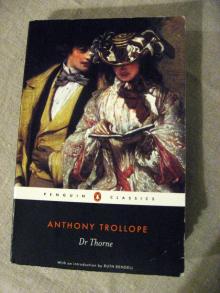 Doctor Thorne
Doctor Thorne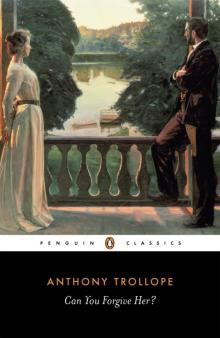 Can You Forgive Her?
Can You Forgive Her?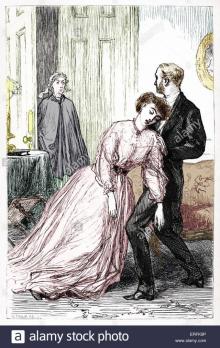 The Last Chronicle of Barset
The Last Chronicle of Barset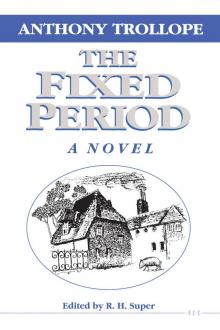 The Fixed Period
The Fixed Period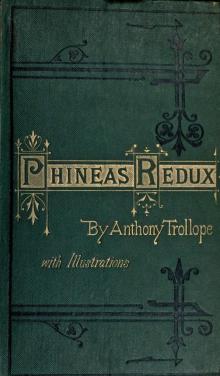 Phineas Redux
Phineas Redux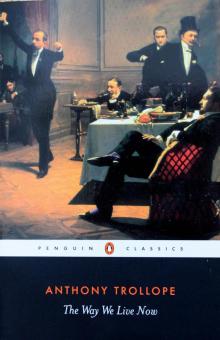 The Way We Live Now
The Way We Live Now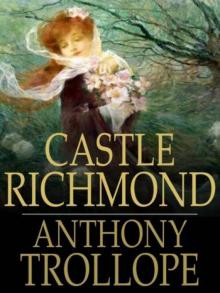 Castle Richmond
Castle Richmond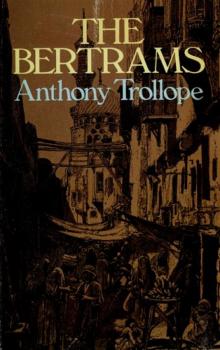 The Bertrams
The Bertrams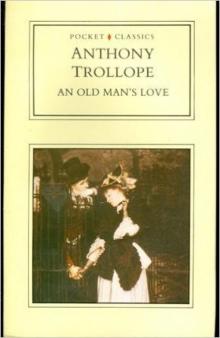 An Old Man's Love
An Old Man's Love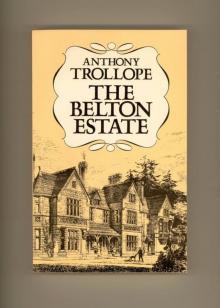 The Belton Estate
The Belton Estate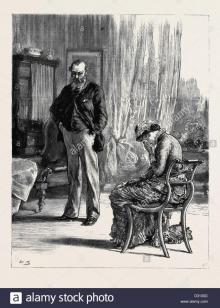 Marion Fay: A Novel
Marion Fay: A Novel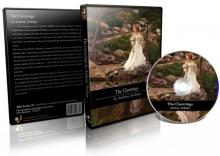 The Claverings
The Claverings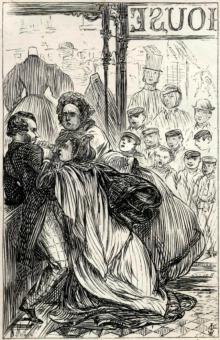 The Struggles of Brown, Jones, and Robinson
The Struggles of Brown, Jones, and Robinson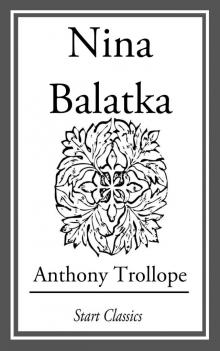 Nina Balatka
Nina Balatka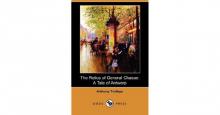 The Relics of General Chasse: A Tale of Antwerp
The Relics of General Chasse: A Tale of Antwerp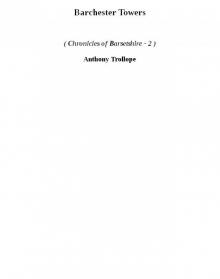 Barchester Towers cob-2
Barchester Towers cob-2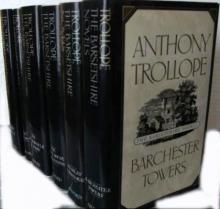 The Chronicles of Barsetshire
The Chronicles of Barsetshire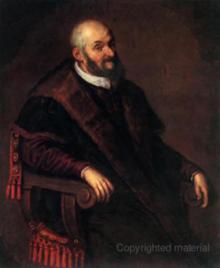 The Warden cob-1
The Warden cob-1 Framley Parsonage
Framley Parsonage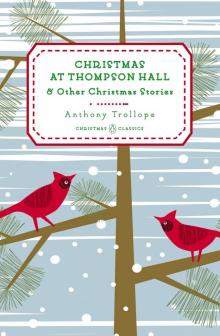 Christmas at Thompson Hall
Christmas at Thompson Hall The Warden
The Warden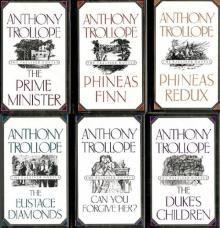 The Palliser Novels
The Palliser Novels The Small House at Allington
The Small House at Allington Barchester Towers
Barchester Towers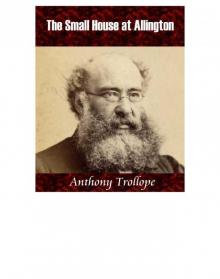 The Small House at Allington cob-5
The Small House at Allington cob-5 The Duke's Children
The Duke's Children Phineas Finn, the Irish Member
Phineas Finn, the Irish Member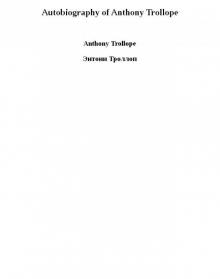 Autobiography of Anthony Trollope
Autobiography of Anthony Trollope